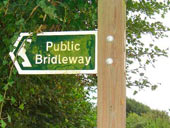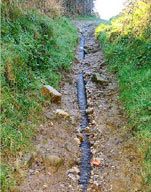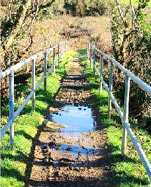Bridleways provide a lovely view of the countryside and an excellent location for exercising a horse or pony. It is up to members of the public to maintain them, making sure they remain open for every one to enjoy.
 Unfortunately every year more countryside is developed and land is farmed more intensively. It is important that every rider does their utmost to keep existing bridleways open and if possible, to create new ones. Unfortunately every year more countryside is developed and land is farmed more intensively. It is important that every rider does their utmost to keep existing bridleways open and if possible, to create new ones.
You can help by following the country code, be courteous and considerate. Behaving politely encourages farmers to keep bridleways open. You should always shut gates behind you, ride slowly past livestock and keep to your path unless it is blocked.
Landowners should keep bridleways clear, but it is also up to riders and walkers to clear natural obstructions such as fallen trees and undergrowth. The more you help, and the more you use bridleways, the longer they'll be open to all who enjoy the countryside.
What To Use
 As you can see from these photos, some of the bridleways are in such a poor state and are in desperate need of tidying and modernisation. A lot of bridleways are virtually As you can see from these photos, some of the bridleways are in such a poor state and are in desperate need of tidying and modernisation. A lot of bridleways are virtually impassable and if you do manage to ride them you are constantly ducking and diving the low branches and extended arms of hedges. impassable and if you do manage to ride them you are constantly ducking and diving the low branches and extended arms of hedges.
This bridleway is clearly dangerous with the exposed piping on a steep hill, making it a hazardous risk for the horses and rider.
Drainage is needed on many bridleways to help prevent the track getting too bogged down.
Before going hacking in the country you need to know where you are allowed to ride and what your rights are. If you are unfamiliar with the area you can find out where all the bridleways are by looking in a ordnance survey map. Always follow the country code when out hacking.
-
Enjoy the countryside and respect its life and work
-
Guard against all risk of fire
-
Fasten all gates after going through them to keep livestock from escaping
-
Keep to the bridleway when going across farmland
-
Do not tamper with livestock, crops or machinery on farmland
-
Do not drop litter
-
Help to keep all water clean
-
Protect wildlife, plants and trees
-
Take special care on country roads
-
Do not make unnecessary noise
|




